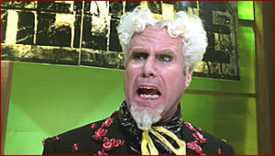What the hell is wrong with college football? How is it possible that we have college football playoffs. So. Completely. Wrong?

DOES ANYONE ELSE NOTICE THIS? I FEEL LIKE ‘M TAKING CRAZY PILLS.
Let me first preempt the inevitable retort from Ohio State Fans: I like Urban Meyer. I like how his Bucks play. This is not an anti-OSU piece. If we are going to debate who the best college football coaches are, Meyer’s name would be in the final four.
But football is not a debate. There’s a very good reason why OSU did not play during championship weekend: they didn’t qualify. Penn State beat them in conference play.
On paper, OSU makes a very compelling case that outcome likely could not be repeated; that it is qualitatively the better team. There may be a lot of truth to that. But upsets count. When Buster Douglas KO’d Iron Mike Tyson, did the WBA, WBC, or IBF set it aside? I doubt many, if any, boxing geeks would pick Douglas as the better fighter “based on his entire body of work.” But he was on February 11, 1990.

Am I the only one around here who cares about the process!?
The lesson of the 2016 Buckeyes is not just that they play as well as anyone, but rather that wild-card teams are necessary to a properly administered playoff structure. But by giving them a pass, if OSU wins out the team at best becomes a national champ with an asterisk. To deny Penn State the chance to defend its status as one of the five reigning Power-5 Champs is, in the world of football, an injustice that no one should abide.
If I sound like a broken record, it’s because I don’t like ignoring things that can be fixed. Especially when there’s no apparent good reason to maintain the status quo. (Hat tip, Rob Mullens for fixing the Mark Helfrich Situation. I thank you and, I assure you, the readers of FishDuck.com thank you whether they agree or disagree with the move: at least they no longer have to suffer my perpetual complaining about the state of Oregon coaching.)

Even Colonel Jessup’s authority was limited.
The Committee–and I don’t mean the individuals that comprise it, I mean its mission and Protocol–represents the worst type of collective action. By design, it is an aristocratic “committee of experts” that arbitrarily and capriciously lords over football from an ivory tower. It is created by those who believe we, the college football consuming public, want them on that wall, we need them on that wall.
Read their Manifesto “Protocol” and try not to imagine Troy McClure reading it. First, the idea that real playoffs are impossible becuase we need to protect student-athletes would come as a surprise to the student-athetes in the 125-school FCS system. Second, you may have noticed that bit about “emphasis on winning conference championships, strength of schedule, and head-to-head competition” being important. Except … when they’re not.

You may remember Troy McClure from such films as “How to Select the Four Best Teams.”
Let’s digress for a moment to review some fundamental Xs and Os of a different nature. For example, from the Merriam-Webster Dictionary, which used to tell us what words once meant before text messaging and the internet killed English:
Arbitrary, adj. 1. Depending on individual discretion; … 2. Founded on prejudice or preference rather than on reason or fact. (This type of decision is often termed arbitrary and capricious.)
Capricious, adj … 2. Contrary to the evidence or established rules of law.
Tyrant n. 1. An absolute ruler unrestrained by law or constitution. 2. A ruler, legitimate or otherwise, who uses his power arbitrarily.
Do you see where I’m going with this?
I doubt that the BCS Group executives or the Committee members think of what they have wrought as an arbitrary tyranny. Yet there it is. In black and white. The dictionary definition.
The professional chattering classes, the Kirk Herbstreits of the world who mock, during the B1G Championship match no less, the idea that a conference champion should get a shot at defending its hill before the runner-up advances, they tell us that this has to be the case. The experts must to be arbitrary because, heck, how else can you pick the four best football teams?

Do not get a mogwai, or a coach, from this man.
Another digression, but for the record, this same class of “reporter” that told Oregon fans to be careful what you wish for in replacing Helfrich–as if asking for a good coach may somehow tempt fate like buying a mystery pet that’s not for sale. In Chinatown. At midnight.
Maybe I am on crazy pills but despite the clamor, the excitement and the marketing dollars the CFP has generated, it’s worse than the BCS because–follow me here–it does not fix the arbitrary selection process but, rather, doubles its scope from 2 to 4.
Rather than an easel upon which the CFP Selection Committee is free to finger paint, the NCAA needs to do its job and structure a real playoff. To its credit the Big12 has reorganized itself for the 2017 season to crown a formal conference champ. They did this because the Committee’s Protocol said that was important. What happens when they get passed over? What happens when the written criteria are set aside again? What happens when the Committee’s eye-ball test is drawn elsewhere? Perhaps, for example, when they’re not quite ready to bless a program’s return to the national stage? Say, after a large scandal or sanctions. Or, just crazy talk here I know, or when the hope of having two recent Champs square off in the final is just too much to pass up?

College debating teams: an appropriate venue for the Selection Committee.
What happens is an arbitrary and capricious result. It is anathema to who we are as a people.
Here’s another crazy idea: fix it. Championship weekend will now involve 10 Power-5 teams. If that is a de facto first round, you have a respectable bracket with one bye slot and as few as 4 wild-cards teams. There are a number of different ways to fix it. But fixed de novo it must be.
And there still can be a place for the Selection Committee in inter-collegiate competition: debate teams. But leave football on the field.
Matt Bryant
Garden City, New York
Top Photo from Video
Disclaimer: Readers: Every writer on FishDuck.com is allowed to express their opinion in their articles. However, articles do not represent the views of the other writers, editors, coaching consultants, management, or the principals of FishDuck.com Charles Fischer
Related Articles:
Oregon Football: Early 2026 Ranking Projections
FishDuck Foaming Over Upside of 2026 Diamond Ducks
Unbelievable...Same SEC Stuff, Different Day
Why Oregon Football Always Belongs in the National Conversation
The B1G Won the 2026 Coaching Carousel...Big-Time!
Continuity? Lanning's Hiring Success is Put to the Test
Matt grew up in Oregon, graduated UO in 1998, and tried to impress a young lady (not from Oregon) by going to law a fancy law school on the East Coast. He did pretty well in law school but never saw the young lady again. Matt is now a lawyer in New York where he bores everyone around him with tales of how much better life can be in the Pacific NW usually carrying on about the biking, the coast, the salmon, the complete lack of humidity, Reubens from The Goose Hollow Inn, and Ducks football.
When Matt is not litigating high-stakes, important, commercial disputes for important people, arguing important points, or writing important things, he is likely either reading, on his bike, or (from late August through February) watching football. He lives with his family on North Shore of Long Island because the coast overlooking the Sound almost has a real shoreline but still can’t hold a candle to Oregon’s coast.

